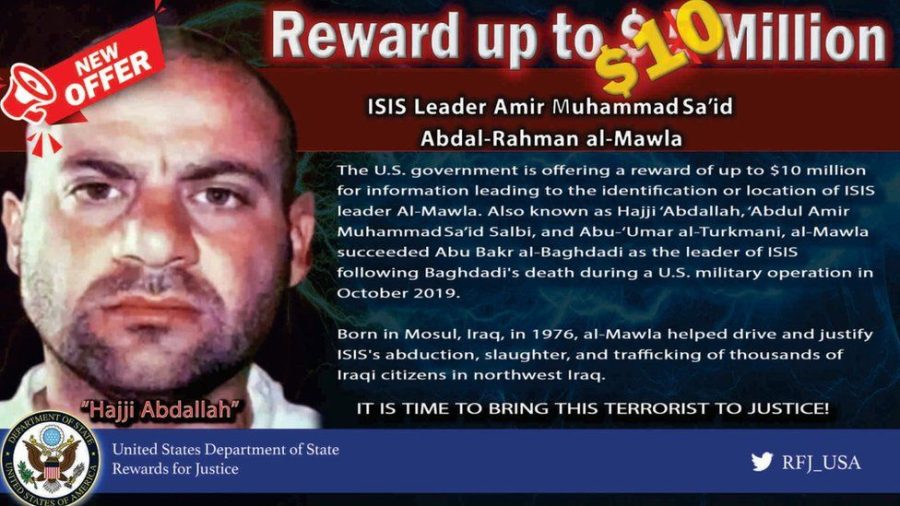U.S. Assassination Not the Powerful Blow Biden Touted
Al-Qurayshi’s high-profile assassination reveals more about his killers than the Islamic State
On February 3, 2022, President Biden held a press conference to announce that the U.S. military had successfully assassinated Abu Ibrahim al-Hashimi al-Qurayshi, the leader of the Islamic State terrorist group (formerly ISIS). Al-Qurayshi “saw the spread of ISIS-affiliated terrorist groups around the world after savaging communities and murdering innocents” according to Biden, who noted his preference for a targeted raid over an airstrike as a “choice to minimize civilian casualties.” The photos taken of Biden in the Situation Room enjoyed comparisons to President Obama during the 2011 attack on Osama bin-Laden’s lair. At the time, Biden opposed the operation, fueling conservative accusations of weakness from which he is now eager to escape as Putin flexes his muscles over Ukraine. This attack was his Commander-in-Chief litmus test. If we accept White House press secretary Jen Psaki’s declaration that Biden delivered a “catastrophic blow” to the Islamic State, he passed with flying colors.
Unfortunately, this operation is unlikely to deeply disrupt the Islamic State’s already decentralized ranks. As the New York Times pointed out, al-Qurayshi’s obsessively low profile ensured that his “most fervent followers would not have recognized him on the street.” Aaron Zelin, a senior fellow at the Washington Institute for Near East Policy, emphasized that the Islamic State is “an organization not focused on charismatic leadership, but ideas…the IS machine will continue with whoever the new leader is.”
Rather than furthering anti-terrorism, al-Qurayshi’s death is another notch in the belt of American exceptionalism. In 1998, Secretary of State Madeline Albright claimed, “If we have to use force, it is because we are America; we are the indispensable nation.” At the time of her infamous speech, the U.S. military was riding high on post-Cold War clout. General Wesley Clark’s memoir recounts a private conversation with Secretary of Defense Paul Wolfowitz, in which he asserted, “We can now use our military with impunity. The Soviets won’t come in to block us. And we’ve got five, maybe ten, years to clean up these old Soviet surrogate regimes like Iraq and Syria.” Wolfowitz’s analysis exemplifies one of America’s most destructive media narratives: framing conflicts for national liberation as Soviet proxy wars, then showering weaponry on whichever side is most economically conservative. According to Professor Jeffrey Sachs at Columbia University, who seeks create a foreign policy free from American exceptionalism, the U.S. “notoriously overestimated the influence of global communism.” Most of the Middle East had no interest in implementing Marxism, an atheistic ideology, in the wake of the 1979 Islamic Revolution. Far from “cleaning up” the Middle East, the U.S. created its own worst enemies by funding guerilla groups like the Mujahadeen, which generated al-Qaeda and the Taliban.
Ivan Eland, the former Director of Defense Policy Studies at the Cato Institute, believes that the War on Terror actually “played right into Osama bin Laden’s hands. A common strategy of terrorists is to strike the stronger aggressor, hope for an overreaction, and thus gain zealous recruits and funding for the terrorists’ cause.” Professor Mirta Galisec of the Santa Fe Institute concurs, “Being a devout member of a particular religion is not a good predictor of violence… we are more likely to accept a dangerous idea if it aligns with our own experiences.” The Indispensable Nation myth encourages the U.S. to enact violent regime changes without considering political replacements, as with the 2003 capture of Iraqi President Saddam Hussein. The power vacuum left in his wake created a decade of civil war and terrorism, culminating in the 2014 Islamic State takeover. One 26-year-old Islamist fighter told U.S. officials, “America came. They took away Saddam, but they also took away our security. I didn’t like Saddam, we were starving then, but at least we didn’t have war. When you came here, the civil war started.” The most effective weapon in a terrorist’s arsenal isn’t bombs, drones, or even U.S.-produced Springer missiles, but the personal and political destabilization brought on by military operations. America believes that it has an “inherent right to make and break the international rules of the game.” If the state is a monopoly on violence, the U.S. military is Hasbro.
Far from making us safer, international perceptions of America as a “powerful but malevolent nation” decrease security. The War on Terror has killed approximately 15,000 Americans. As difficult as that number is to stomach, Middle Eastern citizens fared far worse. Direct civilian deaths totaled approximately 320,000, and indirect deaths from loss of food, water, shelter, or healthcare caused by warfare likely amount to four times that number.U.S. military officials often deeply underestimate civilian deaths, leaving human rights organizations and newspapers fighting a dangerous battle for accountability. According to the Syria Observatory for Human Rights, the U.S. military initially undercounted the civilian cost of al-Qurayshi’s assassination. American military documents state that children are killed or injured in 27 percent of their airstrikes, but New York Times investigative reporter Azmat Khan puts that number closer to 62 percent. She also mentions that the U.S. rarely compensates the families of people who unwittingly sacrificed themselves for the “greater good,” and restitution caps out at 2,500 dollars per person. That adds up to hundreds of thousands of families left in poverty after the death of a breadwinner at the hand of America’s military. Poverty, not incidentally, is the most prevalent commonality among new terrorist recruits.
The concept of an indispensable nation implies the existence of dispensable nations — all populated by dispensable citizens. The most obvious consequence of America’s mass foreign dehumanization is its potential to create more violence down the line, more risk for our brave boys on the front lines. The empirical likelihood of that outcome makes it a fantastic argument, but if America has learned anything from a 20-year-long reactionary operation, our reckoning must extend beyond its own borders and onto the global stage.
Over a year into his presidency, Biden is still hesitating to make that leap. On the one hand, his significant reductions in airstrikes could signal a more humane shift away from Obama-era strategies that depended on covert drone warfare, but he also rejected international calls to ban autonomous weapons that create militaristic immunity. Biden rescinded Trump’s sanctions on the International Criminal Court, allowing them to investigate U.S. human rights violations, but he has also continued to fund Israel’s racial apartheid against Palestinians. He withdrew from Afghanistan, but he also killed ten civilians in a hasty strike on the way out. Shockingly, U.S. Marine Corps General Kenneth McKenzie, who took full responsibility for the deaths, decided that the attack was an honest mistake and “not the result of poor leadership.”
In 2002, bin-Laden told the co-founder of the Taliban, “It is obvious that the media war in this century is one of the strongest methods; in fact, its ratio may reach 90 percent of the total preparation for the battles.” Maybe the president’s PR speaks for itself. Biden didn’t mention the thirteen citizens killed alongside al-Qurayshi in his press conference. He did, however, proudly emphasize that the military operated on his orders.
Sachs’ framework for sustainable and humane foreign policy doesn’t eliminate the option of cautious attacks, especially on international terrorists like bin-Laden or al-Qurayshi. Rather, he prioritizes expert warnings to address the “dynamics that fuel the appeal to terrorism” over strongman posturing designed to score cheap political points. United Nations Counterterrorism Chief Vladimir Voronkov’s commended al-Qurayshi’s assassination, but he also highlighted the unsurpassed importance of “human dignity, trust and social cohesion…This must start with addressing the desperate situation in displacement camps and detention facilities across Syria and Iraq…[which] through no fault of their own remain stranded in this precarious limbo, at a growing risk of further radicalization and recruitment.” In order to “pass go” on that mission, Biden will have to drop Obama’s playbook of lethal bureaucracy and the simplistic bilateralism that characterized the Cold War. He’ll have to turn comments about terrorists “savaging communities and murdering innocents” onto his own military. He’ll have to care less about the cameras filming a bomb’s detonation than the innocents hit by the blast.







ovitt • Feb 24, 2022 at 11:55 am
Brilliant analysis, as usual. “Blowback” is what Chalmers Johnson called the sort of thing that happens when you go around willy-nilly blowing up innocent people; alas, both political parties are equally committed to air strikes that kill whole families, thus creating all the more Al-Qurayshi’s.
The way to defeat ISIS is to remove the need for it to exist, a process that requires not Cruise missiles but diplomacy, even-handed treatment of ME minorities, respect for Islam (here at home as well as abroad) or, if that is too much to ask, at least a recognition that you don’t win the hearts and minds of over a billion people by invading, bombing, torturing, and detaining persons who have no hope of even being charged with a crime let alone brought to trial. Life is complicated. Bombs blow up problems; they don’t solve them.
Jullian • Feb 17, 2022 at 2:29 pm
Insightful article Kira.
Jullian • Feb 17, 2022 at 2:28 pm
> If the state is a monopoly on violence, the U.S. military is Hasbro.
https://www.statista.com/statistics/241241/revenue-of-major-toy-companies-worldwide/